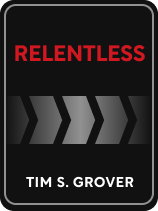

This article is an excerpt from the Shortform book guide to "Relentless" by Tim Grover. Shortform has the world's best summaries and analyses of books you should be reading.
Like this article? Sign up for a free trial here .
Are you feeling unmotivated in life? How can you push yourself so you can achieve anything you want?
According to motivational speaker and trainer Tim Grover in his book Relentless, success comes from constant pressure on yourself. Pressuring yourself the right way can help you become a better leader and look at success in a different light.
Let’s look at how to push yourself in the most productive and accomplished way possible.
How to Productively Push Yourself
While pushing yourself can help keep you relentless, Grover warns that you need to recognize the difference between productive and unproductive pressure. Pressure from your drive to succeed will help you stay relentless, while pressure from something like forgetting to do your work comes from a lack of commitment, and therefore doesn’t help you stay relentless.
(Shortform note: In addition to pressure from a lack of commitment, Sian Beilock (Choke) identifies another source of pressure that’s often unproductive: support from others. You might expect that support would inspire you to succeed, but Beilock argues that a supportive audience makes us pay more attention to the fact that others are watching us. This additional self-consciousness leads to worry and self-doubt, negatively impacting your performance.)
Grover suggests two ways that you can learn how to push yourself: leading others and reframing your successes.
Lead Others
When you’re unstoppable, others will naturally see you as a leader—Grover notes that this is a great way of pushing yourself. That’s because doing everything you can to succeed often requires using this leadership role to make sure the people around you perform at their highest possible level as well.
This leadership role also adds the pressure of needing to accept responsibility and blame if things go wrong—being at the top means that no one else is capable of picking up your slack if you fall short. If you make a mistake or lose your mental composure, it’ll negatively affect the people around you as well. Because everything falls on you in this way, you’ll also feel the pressure of having to make sure things don’t go wrong again (part of your constant search for improvement).
(Shortform note: Marshall Goldsmith (What Got You Here Won’t Get You There) agrees with Grover that leaders should accept responsibility when things go wrong, but his reasoning differs from Grover’s: While Grover argues that you should accept blame to put pressure on yourself, Goldsmith claims that you should accept blame because it’ll earn you the trust and respect of your followers. He says accepting blame earns you trust and respect because it shows your followers that you have integrity, courage, and modesty.)
Reframe Success
The second way you can push yourself is by changing the way you think about success. Instead of viewing it as an excuse to relax, success should increase the pressure you put on yourself. The principle of constantly seeking improvement means that each success is merely a step on your path towards unstoppable dominance in your field—not the destination. After each success, you’ll have to set your sights on the next, larger success instead of relaxing.
(Shortform note: Grant Cardone recommends a similar reframing of success in The 10X Rule, but he takes his argument further than Grover by claiming a one-time achievement shouldn’t even be called success—real success is only gained through many accomplishments over a long period of time. By adopting Cardone’s mindset, you might make it easier to frame one-time accomplishments as single steps on a journey to success, allowing you to keep up pressure on yourself.)

———End of Preview———
Like what you just read? Read the rest of the world's best book summary and analysis of Tim Grover's "Relentless" at Shortform .
Here's what you'll find in our full Relentless summary :
- The qualities you’ll need to become the best in your field
- Why sacrifices and discomfort are necessary for growth
- Why you should practice indulging in your primal self






